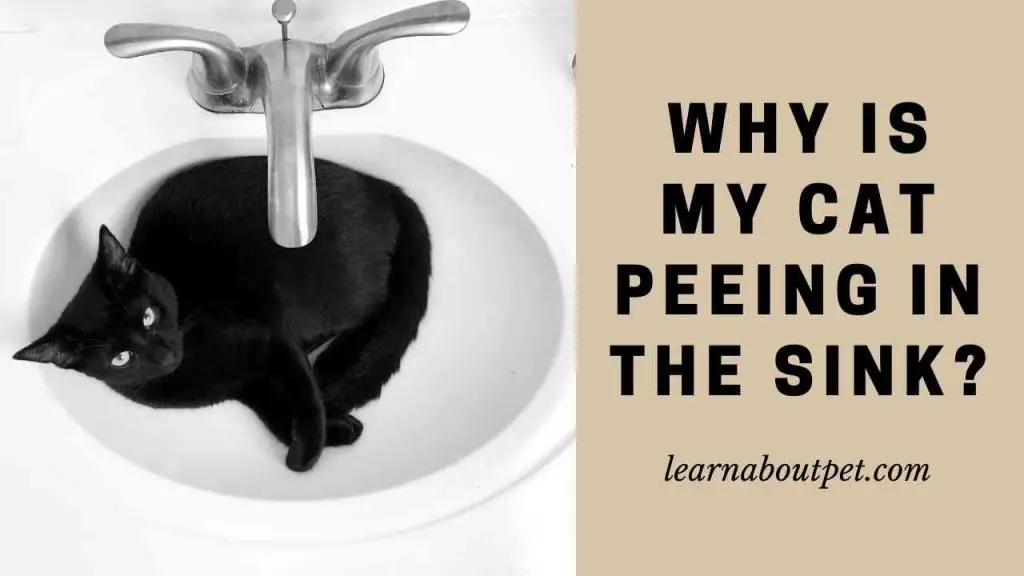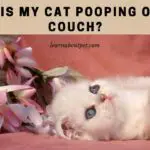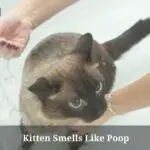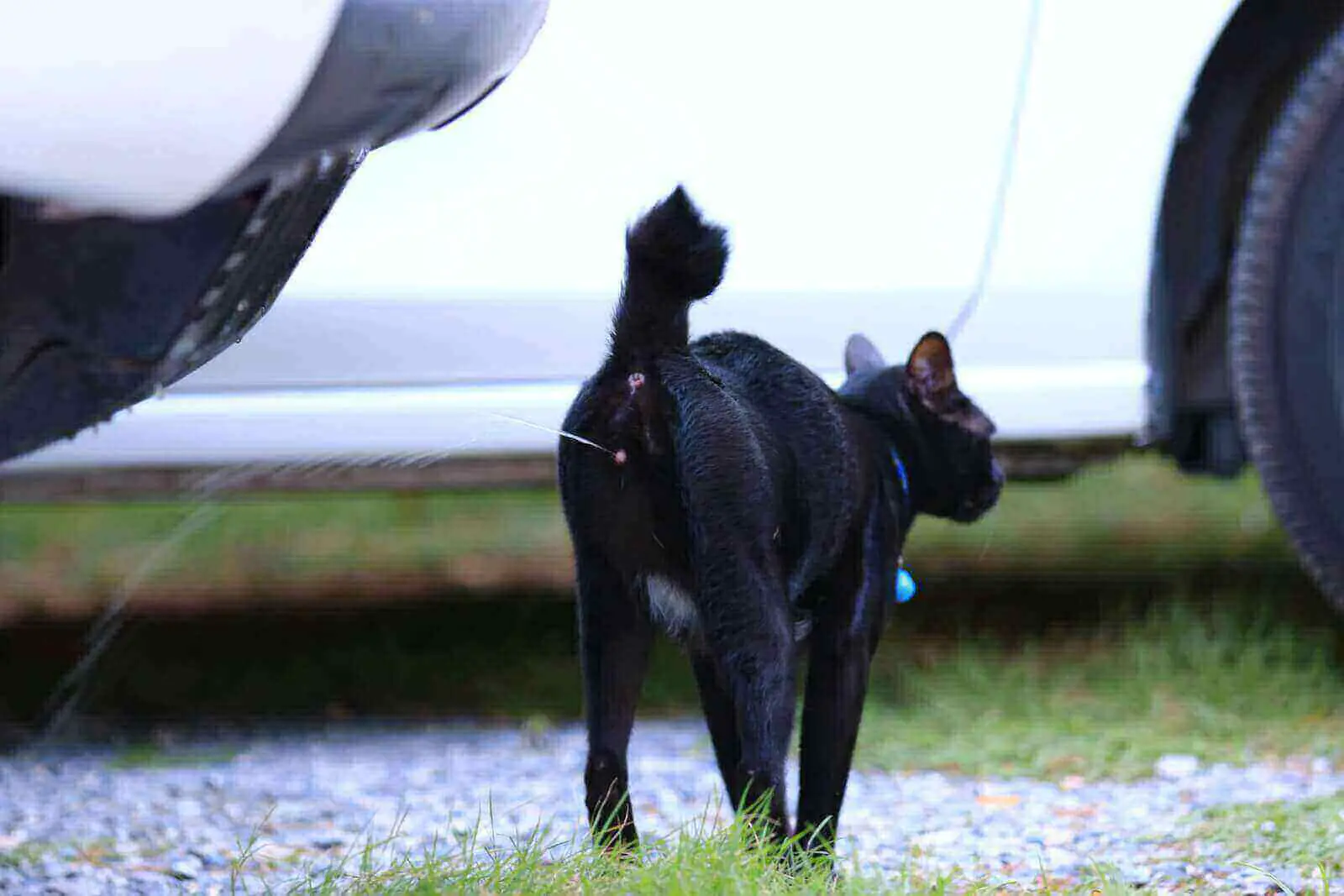You are bound to get very concerned upon noticing that your cat is peeing in the sink. You will definitely want to know why the cat is peeing in the sink, and what you can do about it. This article has the answers.
Why is my cat peeing in the sink? It may be because its litter box is dirty, uncomfortable to use or in a less than ideal location. If it is a very young cat, it may be due to lack of litter training. If it is a very old cat, it may be due to forgetting litter training. It could also be due to stress, territory marking or medical conditions.

Do Cats Pee In Sinks?
Before trying to answer the why is my cat peeing in the sink question, it may be a good idea to first find out whether peeing in the sink is a common cat behavior.
So, do cats pee in sinks? The answer is yes. Cats do sometimes pee in sinks. Many cat owners report incidents of their cats peeing in their sinks.
Sometimes, you may even hear a cat owner exclaim: my cat peed in sink in front of me!
At other times, the cat may not actually pee in the sink in front of you. But you come home to find the unmistakable cat pee in sink smell.
And going by the number of cat peeing in sink Reddit threads, it is clear that this is a relatively common phenomenon.
Because the sinks are normally connected to drains, we also have many people wanting to know, why do cats pee down drains?
Therefore if your cat is peeing in the sink, you need to know that it is doing something that many other cats do. Cats peeing in the sinks is a common – though not exactly normal – phenomenon.
Having established that other cats do sometimes pee in sinks, the key question you should be asking yourself is, why is my cat peeing in the sink?
Why Is My Cat Peeing In The Sink?
There are several reasons why your cat is peeing in the sink.
The first possibility is that you are not cleaning its litter box properly or regularly enough. Or you are not changing the litter regularly.
Now the cat prefers to do its business in clean places.
Therefore it starts peeing outside the litter box, which may lead you to wonder, why does my cat pee out of the litter box?
So the problem may be in that the litter box is dirty. Therefore the cat opts to pee at what it perceives as the next best place. And that may happen to be the sink.
The second possibility is that the cat doesn’t like the litter box or the litter material therein. So it opts to pee at what it perceives as the next best place: the sink.
The third possibility is that the cat has a medical problem, which makes peeing a painful business. That could be a UTI, arthritis or even kidney stones. Now it comes to associate the pain with the litter box.
Then it opts to be peeing outside the litter box. That in a bid to avoid the pain: which it has come to associate with the litter box. So it pees in the sink.
The fourth possibility is that the cat is simply not litter trained. Or if it is a very old cat, it has forgotten its litter training.
The fifth possibility is that the cat is stressed. Stress can induce behavioral problems, like where the cat starts peeing in all manner of weird places. This could then get you wondering, why is my cat peeing in weird places?
The cat may also come to like the sink, and mark it as its ‘territory’ by peeing a little in there.
Why Is My Cat Peeing In The Sink All Of A Sudden?
A situation where your cat was previously peeing in its litter box, then it suddenly starts peeing in the sink can be very startling.
In this situation, you will be entitled to wonder, why is my cat peeing in the sink all of a sudden?
If it is specifically in the kitchen sink, the question becomes, why is my cat peeing in the kitchen sink all of a sudden?
One possibility is that the cat is undergoing stress. Stress can induce sudden behavioral changes. Those include the one where the cat suddenly starts peeing in the sink.
If the stressors aren’t addressed, the cat may permanently continue peeing in the sink. Then you start wondering, why does my cat keep peeing in the sink?
Another possibility is that the cat is ill. For instance, it may have conditions that induce incontinence. Or it may have conditions that make peeing a painful affair.
If peeing becomes a painful affair, the cat may opt to avoid the pain by peeing somewhere different from where it has always peed. This may happen to be the sink.
It could also be that the litter box has become unattractive to the cat. Maybe on account of the litter material you are using lately. Or because of the location you have moved it to. This may make the cat start peeing in the sink suddenly.
Why Does My Male Cat Pee In The Sink?
It may be that the male cat has come to like the sink, and opts to mark it as his ‘territory’ using pee.
There is also the possibility that the cat is sick, stressed or it has forgotten its litter training.
Its litter box may also be too dirty, or in an unattractive location. So this makes the cat pee at what it views as the next best place: the sink.

Why Is My Female Cat Peeing In The Sink?
The cat may have a medical condition, like a UTI. The condition may make peeing painful for it. The cat then associates the pain with its litter box. And it decides to avoid the pain by peeing out of the litter box: in the sink.
The cat may also be undergoing stress. Or it may be peeing in the sink because it finds its litter box unusable. Perhaps because it is dirty or the litter material irritates it.
If it is a very old female cat, it may have forgotten its litter training. And if it is very young, it may not yet have fully internalized its litter training…
Therefore if you have been wondering, why does my female cat pee in the sink, those are the key possibilities.
Why Is My Cat Peeing And Pooping In The Sink?
In this case, the cat may have decided to turn the sink into its new litter box. The reason may be that its usual litter box is unattractive to it. That could be because the litter box is too dirty.
Or it could be that the litter material is irritating the cat. Further, it could be that the litter box location is no longer ideal for the cat.
Or the cat may be undergoing severe stress, which induces behavioral changes: like this one of shifting from peeing in its litter box, to peeing in the sink.
Then again, the cat may be sick. This is the likely possibility if, say, you have a cat peeing in sink blood and pooping there as well. So that could get you wondering, why is my cat peeing blood in the sink, and pooping there as well?
In this case, the most likely cause is illness: and an urgent vet visit is necessary.
How Do I Clean Cat Pee In My Sink?
A person posing the why is my cat peeing in the sink question may also want to know how to clean cat pee in the sink.
And the answer is that, if you want to properly clean cat pee from your sink, you need to consider using an enzymatic cleaner. You can also use vinegar or baking soda solution to disinfect the sink.
You need to avoid using bleach or ammonia to clean cat pee from the sink. Ammonia may worsen the smell. Bleach can react with pee, to create lethal fumes.
How Do I Stop My Cat From Peeing In The Sink?
After the why is my cat peeing in the sink question may come this one: on how to stop my cat from peeing in the sink.
When it comes to figuring out how to get cat to stop peeing in sink, there are two strategies you can use.
Firstly, establish why the cat is peeing in the sink. Then address that problem. If it is the litter box that is dirty, be cleaning it regularly and thoroughly.
If it is the litter material that is the problem, switch to another one the cat is more comfortable with.
Where the problem is the litter box location, switch to a location that the cat is more comfortable with.
If it is a medical problem – like a UTI, kidney stones or arthritis – get a vet to diagnose and treat the cat.
But remember, the medical treatments may not work where the problem is more of a behavioral nature. For instance, in case of cat peeing in sink no UTI treatment will solve the problem if it is actually due to stress.
But a good vet should be able to establish exactly where the problem lies, then help you resolve it: even if it is of a behavioral nature.
The second strategy you can use is that of keeping the cat from the sink. For instance, if you squeeze lemon or orange juice into the sink, the cat won’t dare venture into the sink.
Final Verdict – Why Is My Cat Peeing In The Sink
Why is my cat peeing in the sink? A cat may start peeing in the sink if its litter box is too dirty. Or if the litter material (in the litter box) is unattractive to the cat. Or if the litter box is in an improper location for the cat. The cat may also start peeing in the sink if it has medical conditions that make peeing a painful affair.
So it associates the peeing pain with the litter box, and opts to avoid it by peeing elsewhere: in the sink.
A cat that is under immense stress may also start exhibiting behavioral changes: including peeing in the sink.
And a very young cat that is not fully litter trained may pee in the sink if it views it as an ideal spot to pee. On the other hand, a very old cat may forget its litter training: and hence start peeing in the sink.

Once you identify the reason behind a cat peeing in the sink, you can tackle that issue, to get the cat to stop peeing in the sink.
You can also make the sink unattractive to the cat by spraying some sort of citric juice in it.
As a pet lover, make sure to learn about pet more and give your pet cat a good and comfortable life!

Welcome to Learn About Pet. My name is Rajkumar Ravichandran and I love all pets, travel, and amazing food. I write about my passion and personal experience caring for multiple pets in this blog! ❤️
Post Disclaimer
DISCLAIMER: THIS BLOG OR WEBSITE, "Learn About Pet", DOES NOT PROVIDE YOU WITH MEDICAL ADVICE AND IS NOT A SUBSTITUTE FOR MEDICAL ADVICE. ALWAYS GET IN TOUCH WITH YOUR PERSONAL VETERINARIAN AND USE INFORMATION HERE AS GENERAL ADVICE.
The information, including but not limited to, text, graphics, images and other material contained on this website are for informational purposes only. No material on this site is intended to be a substitute for professional veterinary advice, food recommendation, diagnosis, or treatment. Always seek the advice of your veterinarian or other qualified health care provider with any questions you may have regarding a medical condition or for pet food related questions.







